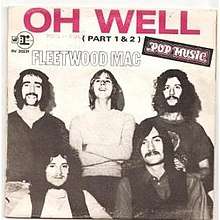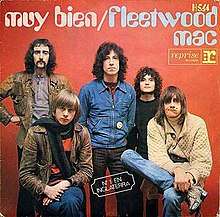Oh Well (song)
"Oh Well" is a song first recorded by Fleetwood Mac in 1969, composed by vocalist and lead guitarist Peter Green. It first appeared as a Fleetwood Mac single in various countries in 1969 and subsequently appeared on revised versions of that year's Then Play On album and the Greatest Hits album in 1971. It was later featured on the 1992 boxed set 25 Years – The Chain, on the 2002 compilation album The Best of Peter Green's Fleetwood Mac as well as on the 2018 compilation 50 Years - Don't Stop.
| "Oh Well" | ||||
|---|---|---|---|---|
 Cover of the French release: (back row, L-R) McVie, Kirwan, Green (front row L-R) Spencer, Fleetwood | ||||
| Single by Fleetwood Mac | ||||
| A-side | "Oh Well, Part 1" | |||
| B-side | "Oh Well, Part 2" | |||
| Released | 26 September 1969 | |||
| Recorded | Summer 1969 | |||
| Genre | ||||
| Length | 3:22 (Part 1 single) 2:22 (Part 1) 5:39 (Part 2) 8:56 (Then Play On version) | |||
| Label | Reprise | |||
| Songwriter(s) | Peter Green | |||
| Producer(s) | Fleetwood Mac | |||
| Fleetwood Mac singles chronology | ||||
| ||||
| Alternative cover | ||||
 Cover of the Spanish release: McVie, Kirwan, Green, Spencer, Fleetwood | ||||
"Oh Well" was composed in two parts, "Part 1" being a fast electric blues song with vocals (lasting 2:19), "Part 2" being an entirely different instrumental piece with a classical influence (lasting 5:39). The original 1969 single features the first minute of "Part 2" as a fade-out coda to the A-side and then "Part 2" begins again on the B-side. Later releases varied in length. At concerts, only the first part was played, and live versions of the song have been released on many Fleetwood Mac live albums throughout their career such as Live and Live at the BBC, as well on the B-sides of singles. After Green's departure, the song was sung by various other members, including Bob Welch, Dave Walker, Lindsey Buckingham,[1] Billy Burnette and Mike Campbell.[2]
Composition
Peter Green wrote what would be part 2 of "Oh Well" on a Ramirez Spanish guitar, which he purchased after hearing the instrument on the radio.[3] "Part 1", which Green dismissed as a "throwaway riff", was intended to appear on the flip side of Part 2.[4]
The first part of the song features a fast blues guitar riff played by Green, joined subsequently by Danny Kirwan and bassist John McVie, before a musical silence, punctuated only by Mick Fleetwood's cowbell percussion. Green sings a brief verse with no musical accompaniment, before the riff begins again and Kirwan takes a solo. Another silence precedes a second verse, and a replay of the riff.[5] Where the second part follows, there is a brief pause before Green's sombre, Spanish-style acoustic guitar and low electric guitar,[5] leading to further instrumental passages of recorder, cello and piano, the latter played by Jeremy Spencer. This was Spencer's only contribution to the song, as he was absent from the recording of "Part 1", and Green played all the other instruments heard during "Part 2". During live performances with the original lineup, Spencer frequently played supplemental percussion during the song, often maracas.[6]
Instead of including "Oh Well" in the UK track listing of Then Play On, the label decided to designate it as the band's next single. This came as a surprise to the song's writer, Peter Green, who expected "When You Say", a Kirwan composition, to fulfill that role instead.[7] Hesitant to release "Oh Well Part 1" as a single, Green lobbied to make "Part 2" the A-side instead, but to no avail.[3] Fleetwood and McVie even bet Green eight pounds apiece that "Oh Well" would flop, but the single instead went on to chart in several territories.[8]
"Oh Well, Part 1" has been viewed by some critics as one of the early crossovers between blues rock and heavy metal, along with songs by others such as Led Zeppelin.[5] Indeed, John Paul Jones drew inspiration from "Oh Well, Part 1" when composing the riff to "Black Dog". John Brackett, a former professor from the University of Utah, notes that both songs employ "call and response vocals and a syncopated ascending chromatic motif that finishes with a long sustained note".[9] Although recorded on a multitrack recorder, the song is not available in true stereo.
After the single was released, US versions of the Then Play On album were updated to include the song. The album edit of "Oh Well" simply joined the two sides of the single as one track, entitled "Oh Well" (lasting 8:56), so that "Part 2"'s beginning is heard twice. This was repeated on the worldwide original CD release. A 1972 US reissue of the single featured just the electric "Part 1" without the coda. Other reissues of the song, including the Greatest Hits album and the 2013 Deluxe Then Play On, generally feature the original single releases of Part 1 (with coda) and Part 2 as two separate tracks.
Chart performance
The single's peak position in the UK Charts was No. 2 for two weeks in November 1969, spending a total of 16 weeks on the chart.[10] In the Dutch Top 40, it peaked at No. 1, staying in the chart for 11 weeks.[11] It also reached the top 5 in Ireland, Norway, New Zealand and France, and the top 10 in Germany and Switzerland.[12]
"Oh Well" was a minor hit in the United States, where it reached #55, becoming Fleetwood Mac's first single to reach the Hot 100, as well as their only pre-Buckingham/Nicks song to earn this distinction. The song received some airplay on some FM rock stations[13] and its reputation has grown in the years since its release.[5]
The single was also issued in Argentina, Brazil, Canada, India, Italy, Japan, Lebanon, Mexico (as "Ah Bueno"), Portugal and Spain (as "Muy Bien"), and South Africa and Venezuela (as "Oh Bien") on Reprise Records. Other countries included Greece on Warner Bros. Records and Malaysia on Jaguare Records.
Cover versions and other uses
"Oh Well" has been covered on record by many other artists and groups, including Billy Gibbons, Tom Petty and the Heartbreakers, Kenny Wayne Shepherd, Monks of Doom, Gordon Giltrap, Joe Jackson, The Rockets, Big Country, Tribe of Gypsies, Ratt, Tourniquet, McCoy, John Parr, Oh Well, Haim, Jason Isbell and the 400 Unit, and Darrell Mansfield. The song was also played live by Jimmy Page & the Black Crowes and released on their 2000 album Live at the Greek. Australian singer-songwriter Rick Springfield performed a version of the song in July 2013 for The A.V. Club's A.V. Undercover series.[14] Eels included a cover of the song on the bonus-disc edition of their 2014 album The Cautionary Tales of Mark Oliver Everett, and it is also found on the 2012 album Fifteen by Colin James.
Former Fleetwood Mac member Bob Welch on his 2003 His Fleetwood Mac Years & Beyond album.[15] To outline the sections, Welch played his guitars along to the original recording so his cover would "closely match the original, but not be exact copies". After the guitars were tracked, Welch gradually muted the original recording as he filled out the song with samples and MIDI. Over the course of a couple weeks, Welch had amassed between 64 and 96 individual tracks. For the master mix, he whittled it down to 32 tracks because he found it too difficult to monitor all of the parts he recorded.[16]
An excerpt from the song can be heard in the Doctor Who story Spearhead from Space. This was filmed around the same time the single was in the charts, and transmitted in January 1970. The song was omitted from later video releases of the story, but finally reintroduced on the DVD release in 2011. The beginning of the song from Live in Boston by Fleetwood Mac can be heard in the second season of the television show Fargo. Part 2 was also sampled by the KLF for their Chill Out album.
The opening guitar riff in the 1979 AC/DC song "Beating Around the Bush" has been referred to by journalist Phil Sutcliffe as being "almost a tribute ...a reflection, I hesitate to say a copy" of Oh Well.[17][18]
Personnel
- Oh Well Part 1
- Peter Green – vocals, electric guitar, dobro
- Danny Kirwan – electric guitar
- John McVie – bass guitar
- Mick Fleetwood – drums, cowbell, congas, maracas, claves
- Oh Well Part 2
- Peter Green – classical guitar, electric guitar, bass guitar, cello, timpani, clash cymbals
- Jeremy Spencer – piano
- Additional Personnel
- Sandra Elsdon – recorder
Charts
Weekly charts
| Chart (1969–70) | Peak position |
|---|---|
| Australia[19] | 17 |
| Austria[20] | 6 |
| Belgium (Ultratop 50 Flanders)[21] | 3 |
| Belgium (Ultratop 50 Wallonia)[22] | 5 |
| Canada (RPM)[23] | 54 |
| France | 2 |
| Germany[24] | 5 |
| Ireland[25] | 5 |
| Netherlands[26] | 1 |
| Norway[27] | 3 |
| Switzerland[28] | 6 |
| UK[29] | 2 |
| US Billboard Hot 100[30] | 55 |
References
- Swenson, John; Swenson, John (1978-10-05). "Fleetwood Mac Clicks Without Nicks". Rolling Stone. Retrieved 2019-06-24.
- Olivier, Bobby (2019-03-14). "Here's how Fleetwood Mac survived without Lindsey Buckingham at N.J. concert: review". nj.com. Retrieved 2019-06-24.
- "The Blue Letter Archives". Bla.fleetwoodmac.net. November 1994. Archived from the original on 2016-03-07. Retrieved 2016-10-02.
- "Peter Green and the Holy Grail". Guitars Exchange. Retrieved 2019-06-25.
- "Oh Well". Allmusic. Retrieved 2 May 2011.
- Ariza, Sergio. "Peter Green Era Fleetwood Mac, So Great But Oh Well..." NO RECESS! Magazine: Not The Last Word In Anything. Retrieved 2019-06-24.
- The Vaudeville Years (CD booklet notes). Fleetwood Mac. Receiver Records. 1998.CS1 maint: others (link)
- Evans, Mike (2011). Fleetwood Mac: The Definitive History. New York, NY 10016: Sterling. p. 62. ISBN 978-1-4027-8630-3.CS1 maint: location (link)
- Brackett, John (January 2008). "Examining Rhythmic and Metric Practices in Led Zeppelin's Musical Style". Popular Music. Cambridge University Press. 27 (1): 61. JSTOR 40212444.
- "Official Charts Company". Retrieved 2011-05-02.
- Stichting Nederlandse Top 40. "Fleetwood Mac - Oh Well! | Top 40". Top40.nl. Retrieved 2016-10-02.
- "Songs from the Year 1969". Tsort.info. Retrieved 2016-10-02.
- Dunphy, Dw (2019-02-14). "Two Songs By Fleetwood Mac Before They Were "Fleetwood Mac"". Retrieved 2019-06-11.
- Modell, Josh (2013-07-16). "Rick Springfield covers Fleetwood Mac · A.V. Undercover: Summer Break · The A.V. Club". Avclub.com. Retrieved 2016-10-02.
- "His Fleetwood Mac Years & Beyond". Retrieved 2017-06-25.
- "Bob Welch, August 4 - 17, 2003". The Penguin. Archived from the original on Jan 3, 2019. Retrieved October 5, 2019.
- "ACDC - Highway To Hell. A Classic Album Under Review (Part 6 of 8)". YouTube. 2013-02-15. Retrieved 2016-10-02.
- "Fleetwood Mac - Oh Well (Part 1 & 2)". YouTube. 2012-07-23. Retrieved 2016-10-02.
- Kent, David (2005). Australian Chart Book 1940–1969). Turramurra, N.S.W.: Australian Chart Book. ISBN 0-646-44439-5.
- Hung, Steffen. "Fleetwood Mac - Oh Well". austriancharts.at. Retrieved 2019-06-04.
- "Ultratop.be – Fleetwood Mac – Oh Well" (in Dutch). Ultratop 50.
- "Ultratop.be – Fleetwood Mac – Oh Well" (in French). Ultratop 50.
- "RPM 100 Singles – Mar. 28, 1970". Library and Archives. Canada.ca. Retrieved June 4, 2019.
- "Offizielle Deutsche Charts - Offizielle Deutsche Charts". www.offiziellecharts.de. Retrieved 2019-06-04.
- "Search the Charts". Irish Recorded Music Association. Archived from the original (enter "Fleetwood Mac" into the "Search by Artist" box, then select "Search") on 21 July 2011. Retrieved 3 May 2010.
- Hung, Steffen. "Fleetwood Mac - Oh Well". hitparade.ch. Retrieved 2019-06-04.
- "norwegiancharts.com - Fleetwood Mac - Oh Well". norwegiancharts.com. Retrieved 2019-06-04.
- "Fleetwood Mac - Oh Well - hitparade.ch". hitparade.ch. Retrieved 2019-06-04.
- "Fleetwood Mac | full Official Chart History | Official Charts Company". www.officialcharts.com. Retrieved 2019-06-04.
- "Fleetwood Mac Chart History (Hot 100)". Billboard.